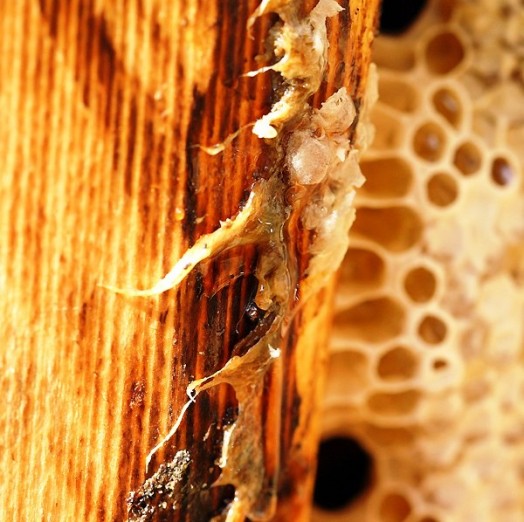What is Propolis?
Propolis, bee glue, is an increasingly important contact allergy because of it's increased use in "natural products". Just because it's natural doesn't mean you can't have an allergic reaction to the substance.
In modern times, propolis is used as:
Propolis, bee glue, is an increasingly important contact allergy because of it's increased use in "natural products". Just because it's natural doesn't mean you can't have an allergic reaction to the substance.
- Propolis is a glue made by hone bees to build, repair and protect their hives.
- It's made up of digested resins (natural glues), buds from trees, and bark that bees mix with bee wax.
- It becomes a mixture of balsams and resins, waxes, essential oils, pollen and cinnamyl alcohol, vitamins A, B, C and E, flavanoids and minerals.
- Overall, the chemical composition of propolis is highly variable depending on where the bees live and the types of trees they use to manufacture their glue.
- It can be listed on an ingredient list as propolis, cera flava, and cera alba.
- For 1000s of years propolis has been used by humans to treat infections, wounds, and as a varnish. It's believed to possess antibacterial, antifungal, and antiviral properties. Given these properties, propolis is a common additive in many "natural" products. The increased exposure to propolis has increased our sensitivity and allergic reaction to it.
In modern times, propolis is used as:
- Emulsifying and thickening agent in many cosmetics.
- Food additive for coating and glazing candy and fresh fruit
- Natural over the counter sprays for sore throats, mouth lozenges, cough syrups, ointments, lotions, drops and oral pills.
- Anti-septic agent in many homeopathic and natural medicine
- Varnish for violins
How Do you Know If You Are Allergic To Propolis?
- Many people with propolis allergy will have a rash on/or around mouth (from using topical ointments with propolis), or rash at the site of application (typically face, arms and legs).
- Propolis is used in many "natural" cosmetics and homeopathic remedies. Exposure from these products can cause a rash at the site of application.
- Many people with allergy to propolis are also allergic to balsam of peru, colophony, beeswax, clove oil, and tree buds
- Bee keepers, violin makers, and persons who make handmade boots are at increased risk for developing propolis allergy.
- If you suspect propolis allergy, see an allergist for patch testing to determine the specific cause of your rash


This comment has been removed by a blog administrator.
ReplyDeleteHi, thanks for this post! I just found out I'm allergic to propolis. Does that mean I'm allergic to beeswax as well? Should I avoid all products that contain "beeswax" or just propolis? Thanks!
ReplyDelete